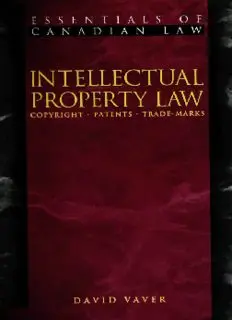
Intellectual Property Law: Copyrights, Patents, Trademarks PDF
Preview Intellectual Property Law: Copyrights, Patents, Trademarks
INTELLECTUAL PROPERTY LAW Other books in Essentials of Canadian Law Series Criminal Law The Law of Evidence Statutory Interpretation Media Law The Law of Trusts Income Tax Law E S S E N T I A L S O F C A N A D I A N L A W INTELLECTUAL PROPERTY LAW Copyright, Patents, Trade-marks DAVID VAVER Professor of Law Osgoode Hall Law School, York University IRWIN LAW INTELLECTUAL PROPERTY LAW © David Vaver, 1997 All rights reserved. No part of this publication may be reproduced, stored in a retrieval system, or transmitted, in any form or by any means, without the prior written permission of the publisher or, in the case of photocopying or other reprographic copying, a licence from CANCOPY (Canadian Copyright Licensing Agency), 6 Adelaide Street East, Suite 900, Toronto, Ontario, M5C 1H6. Published in 1997 by Irwin Law 1800 Steeles Avenue West Concord, Ontario L4K 2P3 ISBN: 1-55221-007-3 Canadian Cataloguing in Publication Data Vaver, D. The law of intellectual property: copyright, patents, trademarks (Essentials of Canadian law) Includes bibliographical references and index. ISBN 1-55221-007-3 1. Intellectual property - Canada. I. Title. II. Series. KE2779.V38 1996 346.7104'8 C96-932181-3 KF2979.V38 1996 Printed and bound in Canada. • 1 5 6 7 8 05 06 SUMMARY TABLE OF CONTENTS FOREWORD BY MADAM JUSTICE BEVERLEY McLACHLIN xvii PREFACE xi.x CHAPTER l: Intellectual Property: An Overview 1 CHAPTER 2: Copyright 21 CHAPTER 3: Patents 113 CHAPTER 4: Trade-marks 173 CHAPTER 5: Management and Enforcement 2.37 CHAPTER 6: Conclusion 270 GLOSSARY 289 TABLE OF CASES 301 INDEX 333 This page intentionally left blank DETAILED TABLE OF CONTENTS FOREWORD BY MADAM JUSTICE BEVERLEY McLACHLIN xvii PREFACE vi.v CHAPTER 1: INTELLECTUAL PROPERTY: AN OVERVIEW / A. Introduction J 1) Why "Intellectual"? "Why Property"? 3 2) Justifying Intellectual Property 6 3) Intellectual Property versus Other Means 8 4) Traditional Perspectives JO a) Balancing Owner and User Interests JO b) Contract J2 B. Some Common Features of Intellectual Property Law 13 1) Territoriality J3 2) Cumulative Rights 14 3) Registration 15 4) Marking Optional 16 5) Constitutional Problems J 7 Further Readings J 9 CHAPTER 2: COPYRIGHT 2/ A. Introduction 2J 1) Contours of Protection 22 2) Non-traditional Subject Matter: Bill C-32 of 1996 23 3) Application to Register 24 viii INTELLECTUAL PROPERTY LAW B. What Is Protected? 24 1) Literary, Dramatic, Musical, and Artistic Works 24 2) Literary Work: Books and Other Writings 26 3) Literary Work: Computer Programs 27 4) A Digression: Integrated Circuit Topographies 28 5) Dramatic Work: Plays, Films, Choreography 29 a) Film, Video, and Formats 30 6) Artistic Work 3J a) Drawings, Plans, Paintings 32 b) Photographs 32 c) Engraving and Sculpture 33 d) Artistic Craftsmanship 33 e) Architecture 34 7) Industrial Design 35 8) Musical Work 36 9) Compilation 38 10) Title of a Work 39 11) Sound Recordings 40 12) Performances 40 13) Broadcasts 40 C. Criteria for Copyrightability: Literary, Dramatic, Musical, and Artistic Works 4 J 1) Originality 4J 2) Fixation 45 3) Connection with Canada, or with a WTO, Bane, or UCC State 46 D. Criteria for Copyrightability: Sound Recordings, Performances, Broadcasts 48 1) Sound Recordings 48 2) Performances 49 3) Broadcasts 49 4) Additional Powers of the Minister 49 E. Title 50 1) Author 51 a) The Unoriginal Author 51 b) Idea Providers Generally Not Authors 51 c) Joint Authors 52 d) Photographs and Films 54 2) Ownership: Employees 55 a) Contract of Service 55 b) Work Produced "in the Course of Employment" 56 c) Journalist Employees 57 3) Ownership: Commissioned Engravings, Photographs, and Portraits 57 Table of Contents 4) Government Work 58 5) Changing Ownership and Implying Rights of Use 60 a) Changing First Ownership by Simple Agreement 60 b) Freelancers: Implied Use Rights for Clients 61 6) Sound Recordings, Performances, Broadcasts 63 F. Duration 63 1) Literary, Dramatic, Musical, and Artistic Works 63 2) Reversion 64 3) Sound Recordings, Performances, Broadcasts 65 G. Owner's Rights: Literary, Dramatic, Musical, and Artistic Works 65 1) First Public Distribution 66 2) Reproduction 68 a) Computer Programs and Files 69 b) Subconscious Copying 7J 3) Subsidiary Rights 72 a) Abridgment 72 b) Translation 72 c) Novelization, Dramatization, Movie Adaptation 73 d) Film, Audio and Video Recording 74 4) Public Performance 74 5) Telecommunication 76 6) Public Exhibition of Artwork 77 7) Rental 78 8) Authorization 79 9) Substantial Infringement 80 a) Taking a Particle Does Not Infringe 8J b) Taking an Essential or Material Part Infringes 81 c) Mediating Artistic Practice: Parody and Postmodernism 83 10) Distributing and Importing Infringing Copies 84 a) Parallel Imports 85 b) Knowledge 86 H. Owners Rights: Sound Recordings, Performances, Broadcasts 87 I. Authors' Moral Rights 88 1) General Features 88 2) Attribution 89 3) Integrity 90 4) Association 93 5) Other Rights 93 6) Waiver 94 7) Justification and Problems 95
